Higher Ground Event Highlights
Fireside Chat with Shaun Donovan, Former US Secretary of Housing and Urban Development & John Rossant, Chairman of NewCities
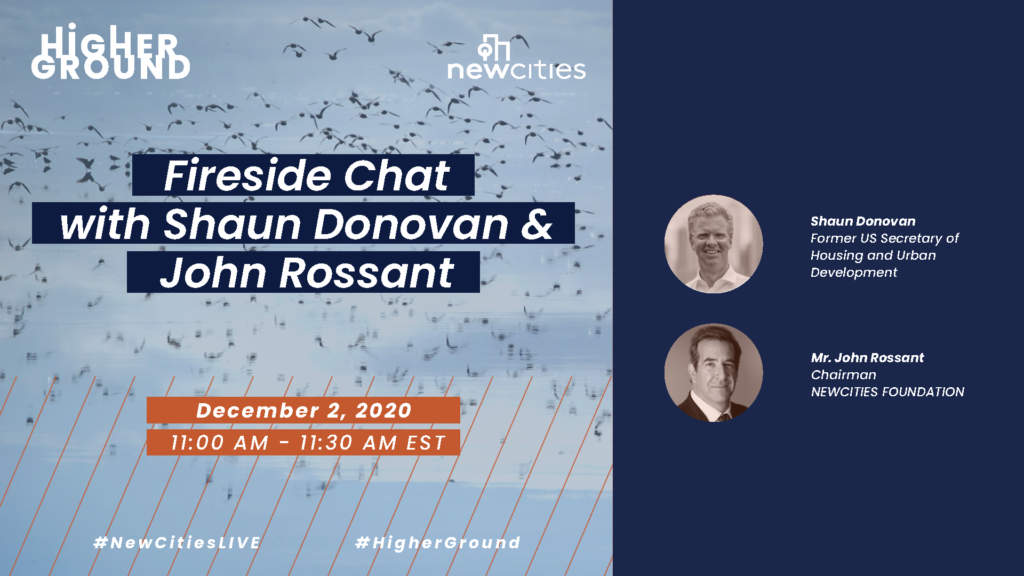
Shaun Donovan shared his hopeful predictions for the change of administration, his past and present campaign motivations, and his prioritization of equity and inclusion into all aspects of his leadership. Here were a few things that stuck out to us:
- “One of the legacies of the Obama administration was to start to change the average Americans view of the impact of climate change on their lives.” An initiative led by the White House to educate local weather reporters on the impacts of climate change became part of the way they described weather forecasts, conveying the knowledge to households.
- “Response to climate change and response to climate risks always has to begin with and be measured by how the most vulnerable in society are treated and whether they are recovering,” To solve the underlying inequality in our society will require a change in the design of recovery programs in the US. Leadership must ensure that new infrastructure and energy sources of the future serve as an economic source and job creation tool for the communities that are so often left behind.
- Every decision made by a city should be a resiliency decision. It is essential to build a culture of resilience guided by climate adaptation and mitigation at the forefront of decision-making.
Keynote Conversation Everyone Should Know What’s Coming
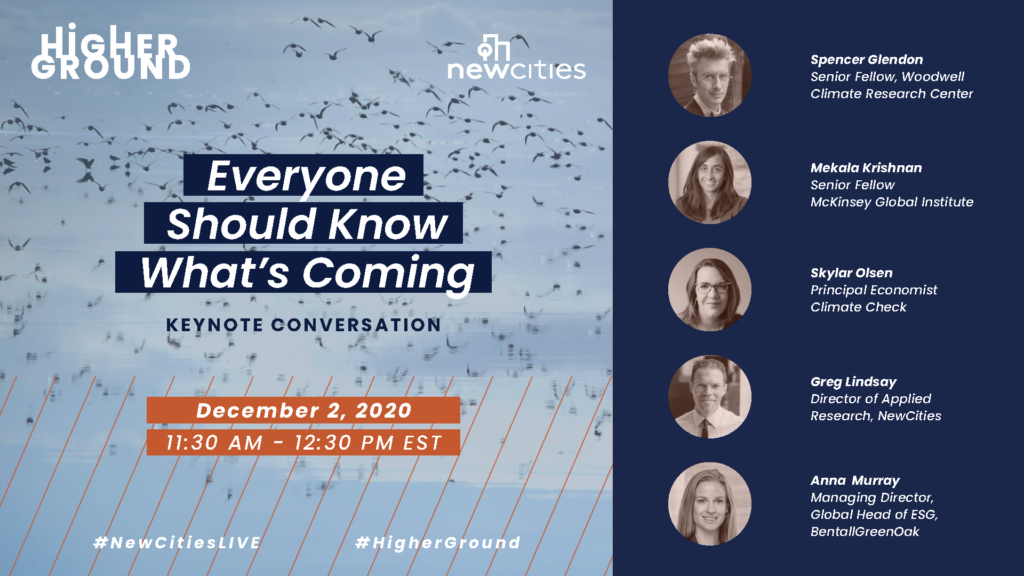
“Everyone Should Know What’s Coming” was an engaging and educational panel exploring climate risk and the use of data to drive decision making and change within organizations. Spencer Glendon, a Senior Fellow at the Woodwell Climate Research Center & Founder of Probable Futures, opened the session with a presentation that captured current climate trends and the risks we face. What we learned:
- Climate stability is foundational to civilization. Our human niche i.e. the stable areas on this planet that allow for the prosperity of the human race in large numbers is rapidly shrinking as we enter unprecedented climate system territory.
- We need accessible, open-source, public data for the public good. Private arbitrage of climate risk data will serve no one in the long-run. As Spencer so nicely put it, “It’s like buying a good seat on the Titanic.” To make climate science accessible to the average person, risk data must be presented in a way that speaks to people and captures regional and local risk.
- One of the main challenges will be integrating climate models and risk data into decision-making. So many decisions are currently made under the assumptions of a stable climate. The risks must be built into processes at all levels to plan for a resilient future. We should shift away from assessing where the most climate risk lies and practice making it one of the lenses organizations use to make decisions.
Keynote Mayor Carmen Yulín Cruz
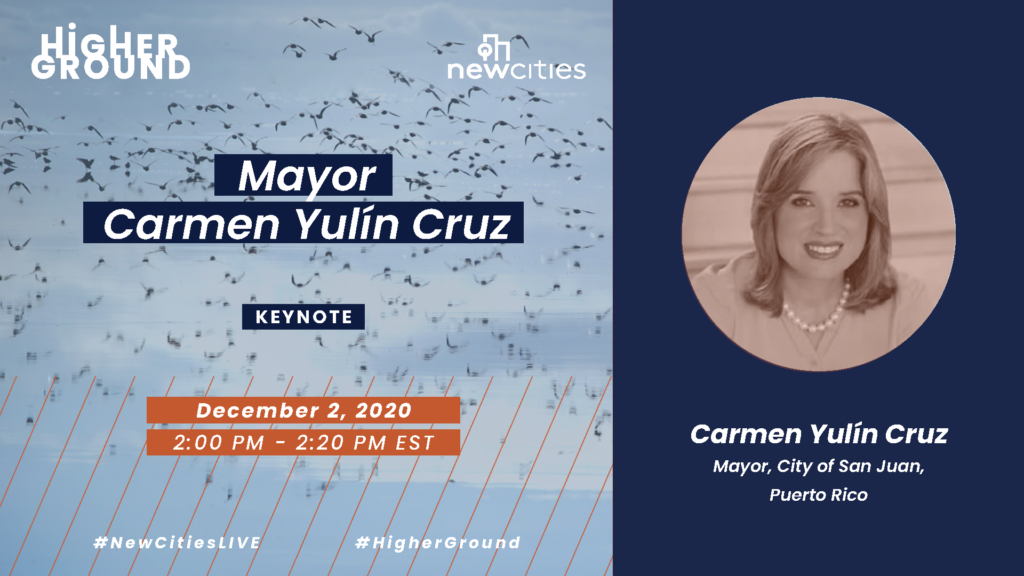
We were fortunate to welcome Mayor Carmen Yulín Cruz of San Juan, Puerto Rico, onto the virtual stage. She graciously shared her experiences governing through Hurricane Maria, leading a city amidst some of the worst consequences of our changing climate.
- Processes must be in place before a crisis hits. Be proactive and have guidelines in place even for the worst-case scenario. This also applies to having supplies accessible when needed in these higher-risk areas. Help must be directed to the city-level.
- “We must understand the ripple effects of crises to prepare with rings of resilience,” says Mayor Cruz as a measure to contain the crisis. We need permanent solutions to recurring problems!
- Synergies between cities are key to prepare for the future of climate migration. Drawing on lessons from past crises, Mayor Cruz believes that cities are fundamental players to align migration policies. Having strong networks of mayors, and the possibility of city ambassadorships as methods to overcome the inefficiency of bureaucracy.
Workshops
- “Cooling Down Our Cities: Coping with the Impacts of Urban Heat Islands” By Bouygues Construction
- “Ready or Reluctant? Preparing US cities for climate migration.” By The National League of Cities (NLC) and Buy-In Community Planning, Inc.
- “They want to move, we want to help. So how do we start?” By Buy-In Community Planning, Inc.
Opening Remarks & Opening Keynote Day 1: City of Orlando Mayor Buddy Dyer & Kim Stanley Robinson
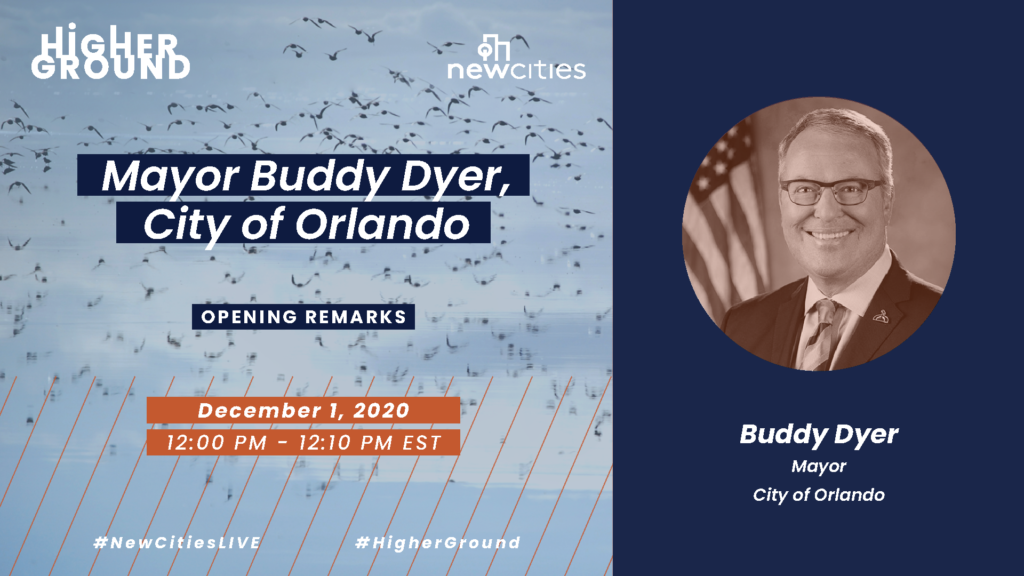
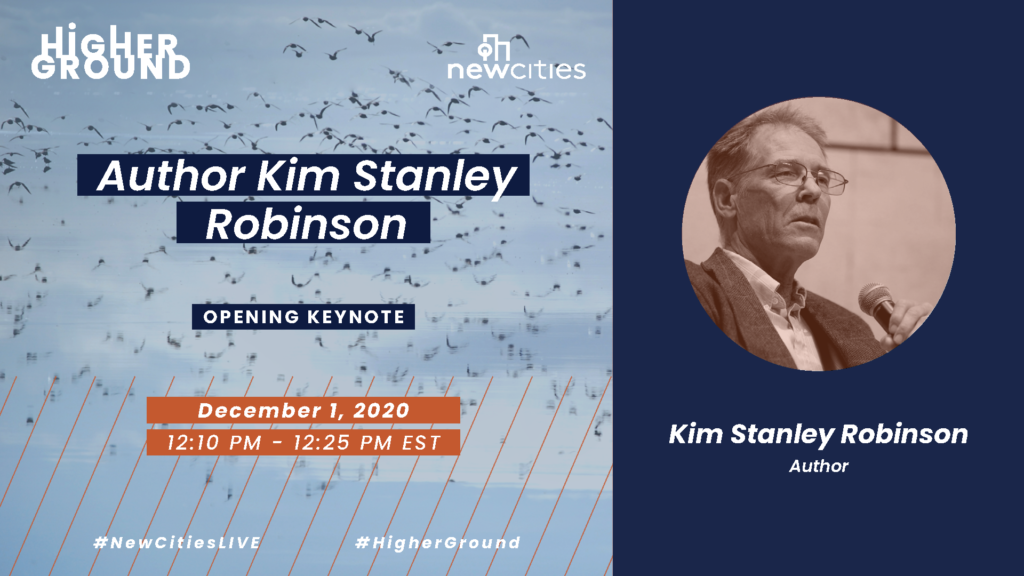
Our event co-host, Mayor Buddy Dyer, opened the event to share Orlando’s story as ground zero for sensing the impacts of climate change. Outfront on the issue of climate change, Mayor Dyer shared the city’s strategies to meet their climate and sustainability commitments.
Kim Stanley Robinson, acclaimed science-fiction writer, followed up with a compelling opening keynote focused on the element of sea level rise. He raised points on the various long-term scenarios, and reiterated that this is our all hands on deck moment.
Kim rightfully brought our attention to the issue of language, and the hidden connotations behind the words we use when it comes to climate-driven displacement. He recommends this article via Eos to get ahead of the language.
Opening Panel Climbing to Higher Ground: Rethinking Resilience
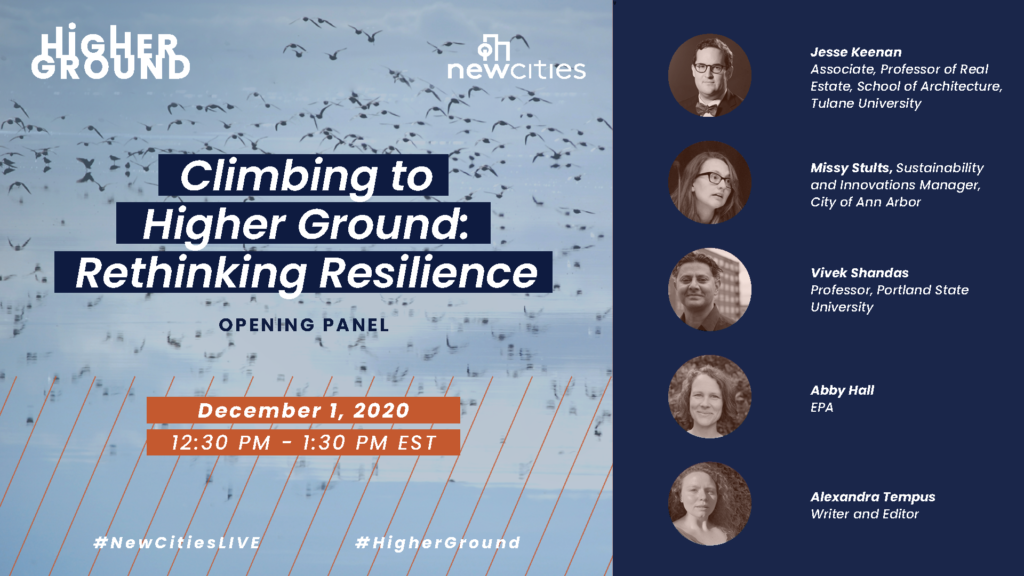
While some have already started retreating from disaster-prone areas, most of us are still catching up to this new reality. The opening panel set the stage for the day, examining the overarching issues and trends of how and where people will decide to move in the face of climate change. Our key takeaways:
- We need to accept a certain level of uncertainty when preparing for climate migration, and to develop tools to measure it. This will allow us to transform the way we work, by giving people permission to think differently, to innovate and to experiment, and by accepting failure as part of that process of bringing systemic change. We need to be comfortable with disruption and get ready for transformation.
- It is crucial to rethink our definition of expertise. If we don’t actively and intensively engage with frontline communities, we are going to see more pernicious consequences of climate change. We need to listen to and build trust with people on the ground, because what works for low-income and minority communities will likely work for the rest of our communities.
- Resilience should be a day-to-day business: it needs to be embedded into existing local plans and strategies. It is also important to break silos between our institutions so that they can share their expertise and collaborate to address intersectional issues in a fluid way.
Panel #2 Cities on the Hill: Building the Communities We Need
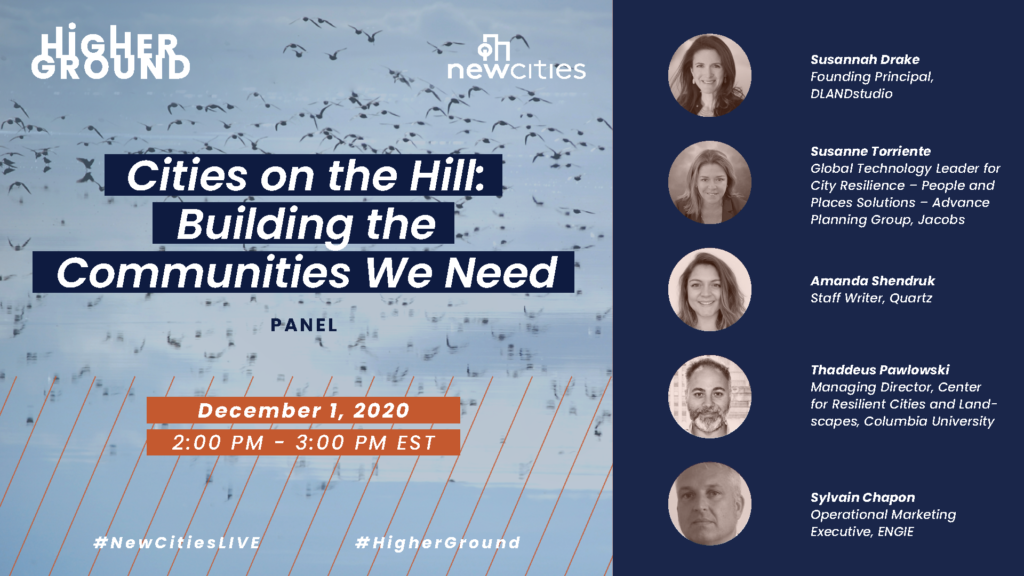
“Cities on the Hill” explored the issue of climate displacement from an urban planning and design perspective, with a strong focus on community. Where will people move and at what scales? The panelists addressed how we can structurally prepare for migration on many levels, while continuously returning to the question: What makes a resilient city?
- A resilient city is extremely self-aware. Due to the transdisciplinary nature of the climate crisis, solutions need to be grounded in the context of greater societal transformative change. All cities face risk, what matters is their willingness for change, openness to new models, and the right local leadership.
- Community considerations are central to planning decisions. Often moving away from harm can mean moving away from home. To figure out how to keep the essence of a community’s culture and heritage together, like through co-creation, is an investment in the right direction.
- “Climate Havens” fail to consider close to home solutions, and divert investment away from building local resilience. It also ignores the carrying capacity of a place to welcome newcomers. It is important to work with the dynamics of the planet to attract people away from vulnerable zones.
Keynote Conversation The Maria Diaspora: Lessons from Three Cities
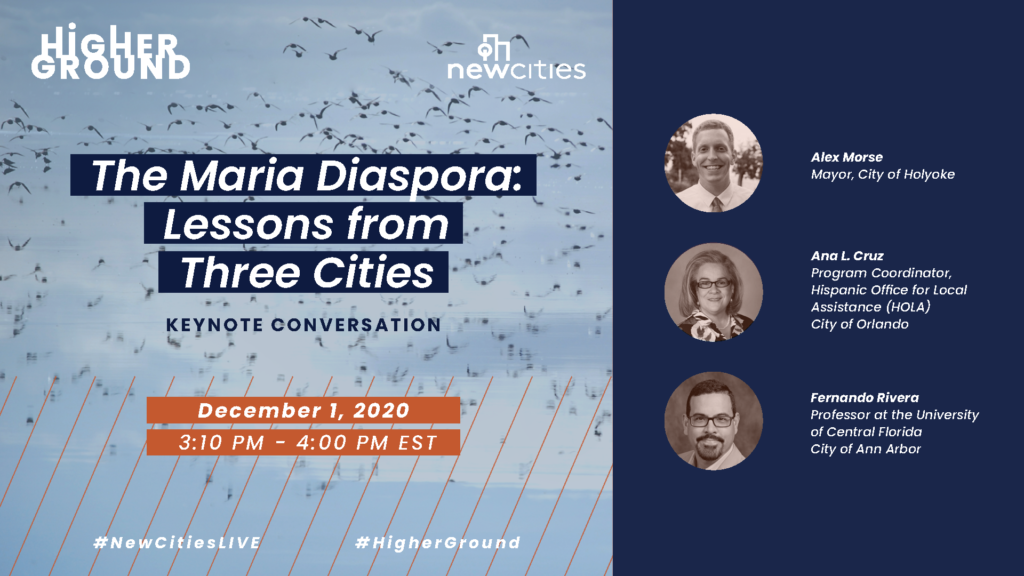
Our keynote conversation on “The Maria Diaspora” provided a concrete example of what climate migration looks like in two receiving cities, Orlando, FL. and Holyoke, MA., that welcomed thousands of Puerto Ricans displaced by Hurricane Maria since 2017.
Both cities faced common challenges, but were also able to rely on similar solutions and support systems. While many migrants already had family or friends where they relocated, a lot of them also didn’t have a place to stay. In Orlando and Holyoke alike, housing was already a long-term challenge. But thanks to a well-prepared and organized response, both places were able to welcome everyone and orient them towards the right resources.
Mayor Morse of Holyoke and Ana Cruz of the Orlando Hispanic Office for Local Assistance both praised the strong desire to help from local communities and the solid partnerships developed with non-profit organizations. But they also reminded us that the response needs to be government-driven, and not only rely on well-intentioned individuals.
Finally, they stressed that preparedness is key. When it comes to emergency-response, both Mayor Morse and Ms. Cruz insisted that being proactive and constantly updating available resources is crucial. As Mayor Morse underlined: “These things will continue to happen unless we go big and bold and actually start to tackle climate change”.
Panel Ready to Receive: How Central Florida is Preparing for Migration
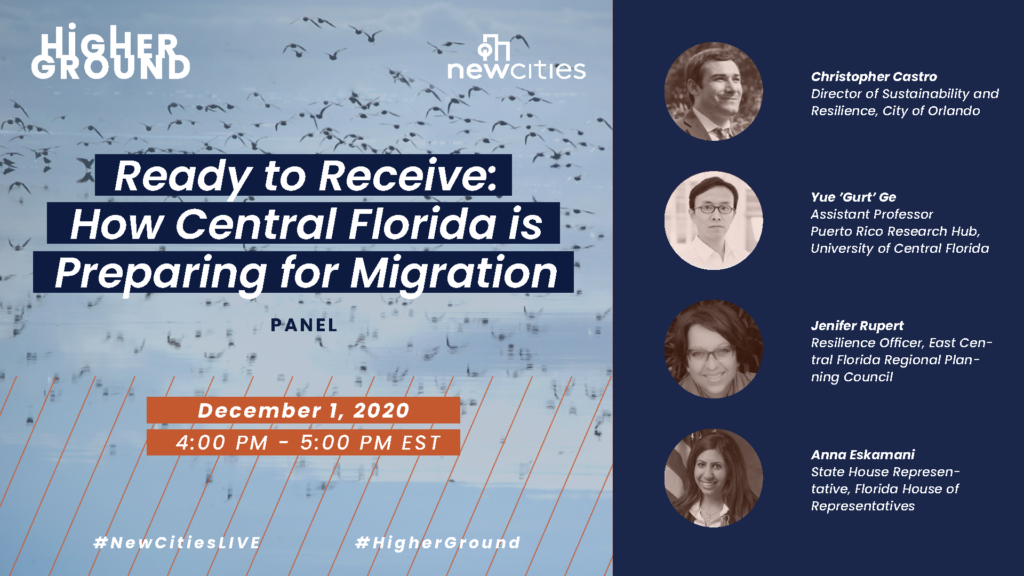
Our final panel of the day focuses in on Florida, a model city for urban sustainability. Moderator Chris Castro, Director of Sustainability and Resilience at the City of Orlando, is joined by a diverse panel of practitioners and local experts representing various levels of government and academia. Here are some touchpoints:
- Climate resilience must be woven throughout city fabric given its intersectionality. Addressing the climate crisis must be a part of city identity.
- Promote a culture of collaboration and partnerships. Working together with different levels of government, businesses, Universities, and nonprofits increases Florida’s capacity to deal with the challenges. State action alongside community-led action.
- Environmental justice needs to be front and center. Co-governance, participatory processes, and codes for landlords are important strategies to better center equity and communities of color.